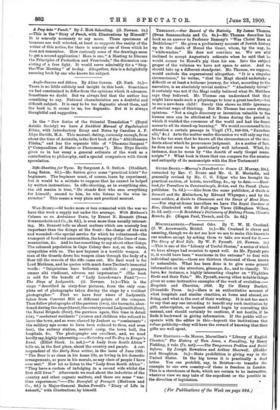Wax-Boons.—Of books more or less connected with the war we
have this week a supply not under the average. With Methuen's Column on an Ambulance Train, by Ernest N. Bennett (Swan Sonnenschein and Co., 2s. 6d.), is even more than usually interest. ing. Mr. Bennett tells us about matters which are scarcely less important than the doings at the front : the charge of the sick and wounded—the special service for which he volunteered—the transport of food and ammunition, the keeping of the lines of com- munication, &c. And he has something to say about other things. The coloured population in Cape Colony does not, on the whole, sympathise with us. The new bayonet is a terrible weapon. A man of the Guards drove his weapon clean through the body of a Boer till the muzzle of the rifle came out. His final word is for Lord Methuen, and he quotes with much force Tacitus's immortal words : " Iniquissima haec bellorum condicio est : prospera omnes sibi vindicant, adversa uni imputantur." (The book is sold for the benefit of " Lady Lansdowne's Fund.") The Siege of Ladysmith. (G. Newnes. ls.)—This is the siege " described in sixty-four pictures, from the only com- plete set of photographs taken during the siege by a resident photographer." First we have four views of Ladysmith taken from Convent Hill at different points of the compass. Then follow photographs of the garrison (two), the barracks, aban- doned during the siege (three), the country round Ladysmith (four), the Naval Brigade (four), the garrison again, this time in detail (six), "combatant residents " (women and children who refused to leave the town, and so were classed by Joubert as "combatants" ; the military age seems to have been reduced to three, and even less), the railway station, neutral camp, the town hall, the hospitals, &c. The photographs are excellent, and, we need hardly say,highly interesting.— Yesterday and To-Day in Kruger's Land. (Elliot Stock. is. net.)—" A Lady from South Africa" tells us, in the first place, about the country and people. A cor- respondent of the Daily News writes, in the issue of June 19th : " The Boer is as clean in his home life, as loving in his domestic arrangements, as pure in his morals, as any class of people I have ever met." Now let us listen to the "Lady from South Africa" : "They have a custom of indulging in a second wife whilst the
first still lives." Afterwards we read about the industries of the country and other cognate matters, and there are some " war-
time experiences."—The Downfall of Prempeh (Methuen and Co., 6d.) is Major-General Baden•Powell's "Diary of Life in Ashanti," with illustrations by himself.


































 Previous page
Previous page